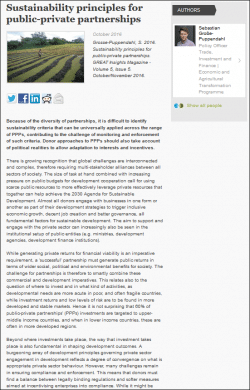- To effectively address the complex and interconnected global development challenges, multi-stakeholder alliances and adequate leveraging of private resources is necessary.
- For a partnership to be successful it must generate public returns in terms of broad social, political and environmental benefits. Therefore, combining development and commercial aims is key.
- While development needs are greater in poor and fragile countries, research shows that public-private partnerships (PPPs) are more often found in upper-middle income countries (60%), and PPPs in lower income countries are concentrated in more developed regions.
- Many development principles have been developed to govern private sector behaviour, but challenges remain with regards to compliance and enforcement. Donors must find a balance between legally-binding regulations and softer measures aimed at incentivizing enterprises to comply. Identifying universal criteria that ensure the sustainability of PPPs is difficult due to the great diversity of such partnerships. Thus, donors should take account of the specific political realities and adapt regulations and incentives accordingly.








